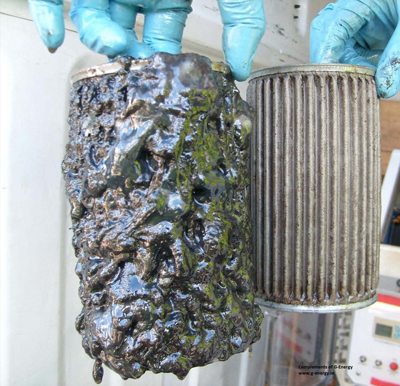CostasV
Mechanical
- May 29, 2003
- 126
A few weeks ago, we found that in the bottom of the backup diesel generator diesel tank (5000 lit), there was about 2cm of dark brown (almost black) sticky sediment, with viscosity like toothpaste, maybe even thicker.
The diesel was inside the tank for about 4 years, no new fuel added. It had 7% biodiesel. We tested the diesel for fungus and bacteria, and the result was negative.
We cleaned the tank (a man inside the tank mechanically removed the sediment from the bottom and the verticall surfaces) and kept this black thick mud in two buckets. Half of the bucket was the mud and above it was black diesel up to 3/4. The next day, when we tried to pour the liquid and to leave only the "solid" mud, we found that the mud had turned into black diesel, leaving only about 2-3cm of the nud in the bottom of the bucket.
Any thoughts of what this sticky mud is? If it was asphaltene, is it expected to be disolved so easily into liquid?
As the bacteria test resulted negative, I guess the bacteria produced mud is ruled out, no?
I am curious if this mud is going to be produced again (after 1-2 years), or if we have removed the most of it.
Has anyone seen something similar?
The diesel was inside the tank for about 4 years, no new fuel added. It had 7% biodiesel. We tested the diesel for fungus and bacteria, and the result was negative.
We cleaned the tank (a man inside the tank mechanically removed the sediment from the bottom and the verticall surfaces) and kept this black thick mud in two buckets. Half of the bucket was the mud and above it was black diesel up to 3/4. The next day, when we tried to pour the liquid and to leave only the "solid" mud, we found that the mud had turned into black diesel, leaving only about 2-3cm of the nud in the bottom of the bucket.
Any thoughts of what this sticky mud is? If it was asphaltene, is it expected to be disolved so easily into liquid?
As the bacteria test resulted negative, I guess the bacteria produced mud is ruled out, no?
I am curious if this mud is going to be produced again (after 1-2 years), or if we have removed the most of it.
Has anyone seen something similar?

